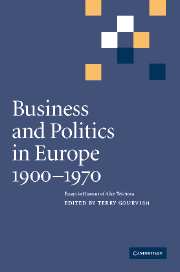Book contents
- Frontmatter
- Contents
- List of figures
- List of tables
- List of contributors
- Preface
- 1 Introduction: the business–government relationship
- Part I The business–politics paradigm
- 2 Business and government in twentieth-century Sweden: a tale of income redistribution and rent-seeking?
- 3 An economic background to Berchtesgaden: business and economic policy in Austria in the 1930s
- 4 Business, politics and revolution in early twentieth-century Ireland
- Part II Banking finance
- Part III Business and politics in the National Socialist period
- Part IV The business community and the state
- Appendix: Alice Teichova: a select bibliography
- Index
2 - Business and government in twentieth-century Sweden: a tale of income redistribution and rent-seeking?
Published online by Cambridge University Press: 12 March 2010
- Frontmatter
- Contents
- List of figures
- List of tables
- List of contributors
- Preface
- 1 Introduction: the business–government relationship
- Part I The business–politics paradigm
- 2 Business and government in twentieth-century Sweden: a tale of income redistribution and rent-seeking?
- 3 An economic background to Berchtesgaden: business and economic policy in Austria in the 1930s
- 4 Business, politics and revolution in early twentieth-century Ireland
- Part II Banking finance
- Part III Business and politics in the National Socialist period
- Part IV The business community and the state
- Appendix: Alice Teichova: a select bibliography
- Index
Summary
Business and government as political economy: some principles
When Alice Teichova's book An Economic Background to Munich was published in 1974, it justly attracted much favourable attention. Analysing a traditional political question, the 1938 agreement between Hitler and Chamberlain in Munich, from an economic perspective, was both original and revolutionary. In clarifying how economic forces influenced (and combined with) the international political developments that resulted in the dismemberment and subsequent German occupation of Czechoslovakia, Alice Teichova adhered to a tradition within social science research that was deeply embedded in classical economic analysis. Indeed, the emerging science of economics was long referred to as ‘political economy’ and, until the ‘Jevonsian-Walrasian revolution’ of the late nineteenth century, it was characterised by a wide scope and a remarkable reliance on historical methods. With the neo-classical breakthrough, however, formal ceteris paribus modelling came to dominate the analysis, and the academic discipline of economics moved further and further away from the inductive approach. During the twentieth century, this shift in the discipline's methodological approach has been reflected in a corresponding shift from professorships in ‘political economy’ to ones in ‘economics’.
During the twentieth century, economic history as a scholarly discipline made inroads precisely because it deals with the questions of long-term economic development on which classical economists such as Adam Smith, David Ricardo, John Stuart Mill and Karl Marx focused their attention. Nonetheless, during the 1960s and early 1970s economic history faced a challenge from economics.
- Type
- Chapter
- Information
- Business and Politics in Europe, 1900–1970Essays in Honour of Alice Teichova, pp. 17 - 41Publisher: Cambridge University PressPrint publication year: 2003
- 1
- Cited by



